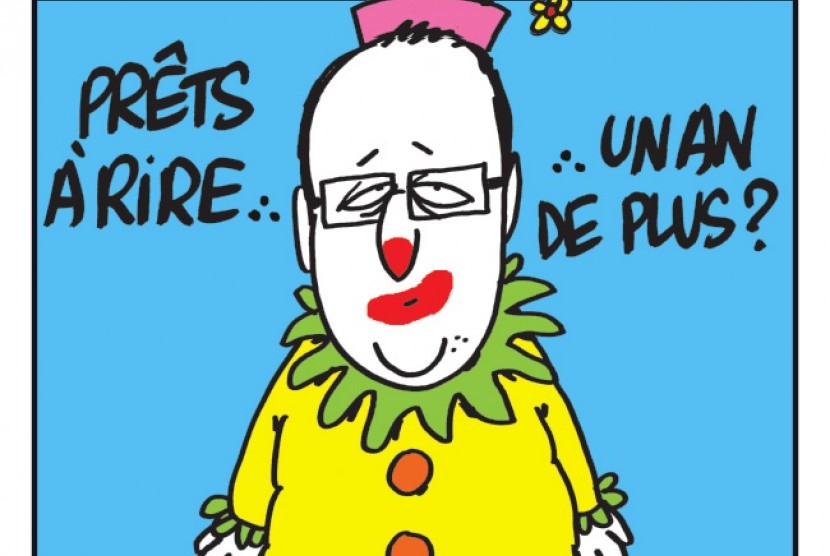REPUBLIKA.CO.ID, CAIRO -- Muslim clerics in the Middle East who have denounced last week's attack on Charlie Hebdo criticised the French satirical weekly on Wednesday for publishing a cartoon depicting Islam's Prophet Mohammad in its first issue after the killings.
On the front of its "survivor's edition", which swiftly sold out its multi-million copy print run in France, the newspaper printed a cartoon of a tearful Mohammad carrying a sign reading "I am Charlie", under the headline "All is forgiven".
While mainstream Muslim leaders around the world have strongly condemned the attack that killed 12 people, many said the decision to print a new cartoon of Mohammad was a provocation that would create a further backlash.
Such cartoons "fuel feelings of hatred and resentment among people" and publishing them "shows contempt" for Muslim feelings, said the Grand Mufti of Jerusalem and Palestinian lands, Mohammed Hussein, in a statement.
Algeria's independent Arab language daily Echorouk responded with a front page cartoon of its own, showing a man carrying a "Je suis Charlie" placard next to a military tank crushing placards from Palestine, Mali, Gaza, Iraq and Syria.
Above, the headline reads: "We are all Mohammad".
While Charlie Hebdo was denounced across much of the Middle East, there were notable exceptions in Turkey, the country with the region's strongest tradition of secularism. An opposition newspaper there, Cumhuriyet, printed a special section of excerpts from the Charlie Hebdo edition.
It printed small, black-and-white versions of the cover in two of its columns, but did not use the image in the special section itself, after "many consultations," its editor in chief Utku Cakirozer said on Twitter.
Police cordoned off its Istanbul headquarters over security concerns and searched trucks leaving its printing press. At the paper's Ankara offices, protesters hung banners on a nearby wall that read: "The Charlie provocation continues."
A Turkish court ordered some website pages that reproduced the Charlie Hebdo cover image to be blocked.
News website T24, nevertheless, ran the image on its site.
"This became a clear freedom of expression issue and no longer about religious sentiments. We published this to defend the values of free expression," its editor, Hazal Ozvaris, told Reuters.
Such attitudes were rare in the region. In Iran, a leading conservative cleric, Grand Ayatollah Nasser Makarem-Shirazi, said the publication of new satirical images of Mohammad "amounts to declaring war on all Muslims".
Egypt's Al-Azhar, a thousand-year-old seat of Islamic learning that has described the Paris attack as a criminal act, called on Muslims to ignore the magazine's cartoons, labelling them "hateful frivolity".
Saudi cleric Iyad Ameen Madani, Secretary General of the Organisation of Islamic Cooperation, denounced the new cartoon as "insolence, ignorance and foolishness".
"Freedom of speech must not become hate-speech," he said.
"No sane person, regardless of doctrine, religion or faith, accepts his beliefs being ridiculed."
Many people on the streets in the Middle East said it was time to move on.
"The cartoons have no meaning, they should not affect us. We as Muslims are bigger and stronger than some cartoon. We should not pay attention, and if we react we should react with word for word and cartoon for cartoon," said Samir Mahmoud, a retired engineer in Cairo.
Emad Awad, a Christian in Cairo, said he understood the anger of his Muslim neighbours but hoped there would be no more unrest: "Now that they've made their point, I really hope this is the last time they do this. I don't think it will lead to more violence, but they missed an opportunity to leave the subject in the past and move forward."


